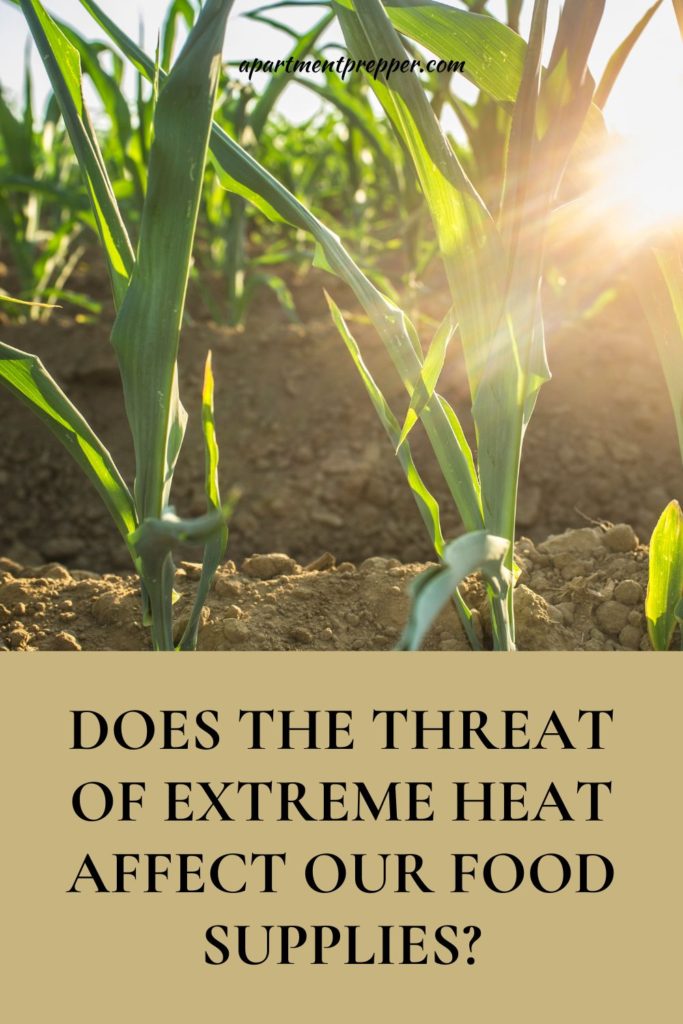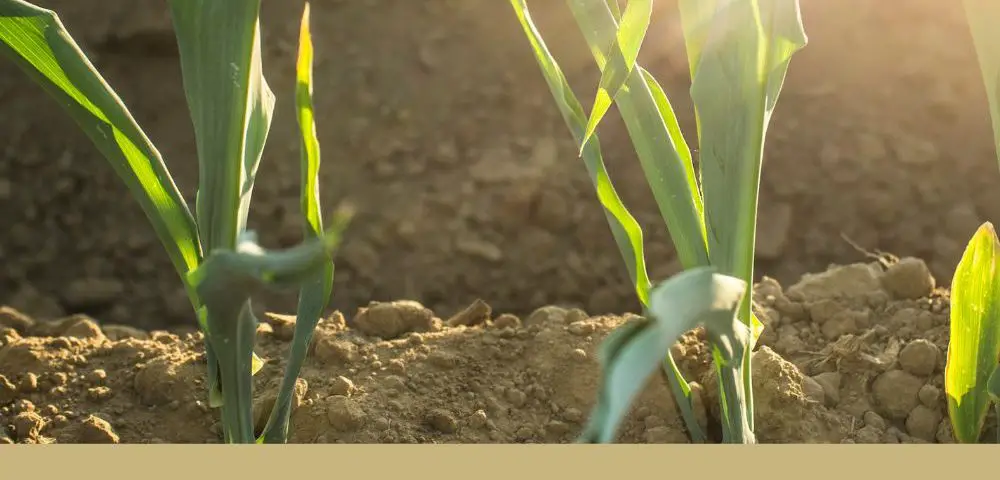Written by Bernie Carr
We’ve all been experiencing extreme heat this summer which makes you wonder whether this poses a threat to our global food supplies. The rising temperatures, prolonged heat waves, and changing weather patterns can significantly impact our food supply. Let’s explore what this means for an average person like you and how we can prepare for this threat.
How Extreme Heat Affects Our Food
Extreme heat can cause real harm to the crops and animals we rely on for food. Here’s how it can impact our food supply:
- Less Food from Crops: High temperatures can make it hard for plants to grow properly, which means we might get less food from our farms. Sometimes, the flowers of the plants may fall off too early, and this affects how fruits and seeds are formed.
- Not Enough Water for Farms: Prolonged heatwaves can make droughts worse, which means there won’t be enough water for the crops to grow well.
- More Pests and Diseases: The heat creates a friendly environment for pests and diseases, which can damage the crops and animals we need for food.
- Troubles for Farm Animals: Animals are also affected by the heat. It can make them eat less, have problems reproducing, and potentially make them susceptible to disease.
- Changing Growing Seasons: Climate change can also mess up the time when we usually grow our food, like planting and harvesting times.
Mitigating the Threat
There are a few ways to prepare for the threat of extreme heat to the food supply.
- Choose Different Kinds of Food: Try to eat a variety of foods that can handle heat and drought better. Support the growth of local crops that are used to your area’s climate.
- Be Smart About Water: Use water wisely by using special systems that save water and collecting rainwater.
- Learn to Grow Food: Learning to grow food is a worthwhile pursuit, no matter how small your space might be. Start growing food in your own backyard or balcony garden and learn how to grow climate-suitable vegetables.
- Start a Small Stockpile: Make sure your pantry is fully stocked with two weeks of water and food, along with any necessary medical supplies.
- Heed Climate Warnings: We can pay attention to the weather warnings and news about the climate, so we know when extreme heat is coming. This way, we can be prepared.
- Don’t Forget Your Pets: Let’s make sure our animals are comfortable in the heat too. Giving them shade and proper ventilation will help them stay healthy.
- Reduce Waste: We can avoid wasting food because it puts more pressure on our food system. Learn about substitutions and use what we have.
Conclusion
Extreme heat does pose a threat to our food supplies, but we can make a difference. By making small changes in our daily lives, supporting our local farmers, and staying informed about climate changes, we can protect our food and prepare for potential threats.
Today’s societal climate not supportive of prepping. With your help, we can keep bringing you content that is often suppressed. Help keep Apartment Prepper alive.
Join me on Patreon for ad-free content.
Or Help out via Paypal
About the author
Bernie Carr is the founder of Apartment Prepper. She has written several books including the best-selling Prepper’s Pocket Guide, Jake and Miller’s Big Adventure, The Penny-Pinching Prepper and How to Prepare for Most Emergencies on a $50 a Month Budget. Bernie’s latest e-book, FRUGAL DIY has just been released on Amazon. Her work appears in sites such as the Allstate Blog and Clark.com, as well as print magazines such as Backwoods Survival Guide and Prepper Survival Guide. She has been featured in national publications such as Fox Business and Popular Mechanics. Learn more about Bernie here.
FB: https://www.facebook.com/apartmentprepper
Instagram: https://www.instagram.com/apartmentpreppers/
Twitter: https://twitter.com/AptPrepper
YouTube: https://www.youtube.com/channel/UC7vOtdbo-wiBeBxD6puCr1Q
Patreon: https://patreon.com/apartmentprepper
Pinterest: https://www.pinterest.com/aptprepper/
Today’s societal climate not supportive of prepping. With your help, we can keep bringing you content that is often suppressed. Help keep Apartment Prepper alive.
Join me on Patreon for ad-free content.
Or Help out via Paypal
About the author
Bernie Carr is the founder of Apartment Prepper. She has written several books including the best-selling Prepper’s Pocket Guide, Jake and Miller’s Big Adventure, The Penny-Pinching Prepper and How to Prepare for Most Emergencies on a $50 a Month Budget. Bernie’s latest e-book, FRUGAL DIY has just been released on Amazon. Her work appears in sites such as the Allstate Blog and Clark.com, as well as print magazines such as Backwoods Survival Guide and Prepper Survival Guide. She has been featured in national publications such as Fox Business and Popular Mechanics. Learn more about Bernie here.
FB: https://www.facebook.com/apartmentprepper
Instagram: https://www.instagram.com/apartmentpreppers/
Twitter: https://twitter.com/AptPrepper
YouTube: https://www.youtube.com/channel/UC7vOtdbo-wiBeBxD6puCr1Q
Patreon: https://patreon.com/apartmentprepper
Pinterest: https://www.pinterest.com/aptprepper/





Summer 2023 has been a real challenge for growing food in Houston Metro area and I decided to research a different approach to watering our fruit trees and garden. Good reference by David Bainbridge, Gardening with Less Water allowed us at home to implement ancient proven watering techniques over several thousand years old. One of them is the Ollas methods, so we followed up with DIY Ollas (terracotta pots) from 99 cent stores. Deep drip watering system. We expanded the rain barrels collection and recycled much of our kitchen water with only biodegradable detergent soap dish for washing dishes. We moved our vermicompost indoor or they would have perished in the extreme heat. If the drought become the new norms it will require a different approach to growing food. Great article, thank you, Bernie.
Hi Carlos, Thanks for sharing your experience in trying the Ollas. I agree growing food has been more challenging these last couple of years, weather has been more unpredictable than normal. Hopefully, you’ll have some success in the fall as the cooler weather comes in.